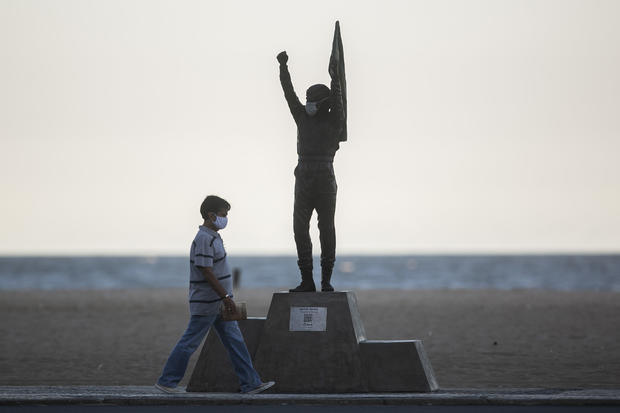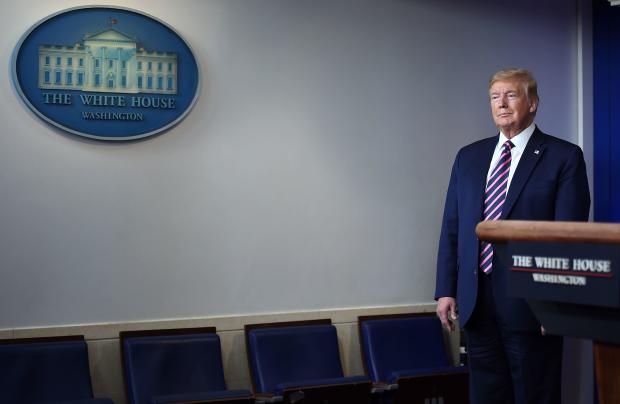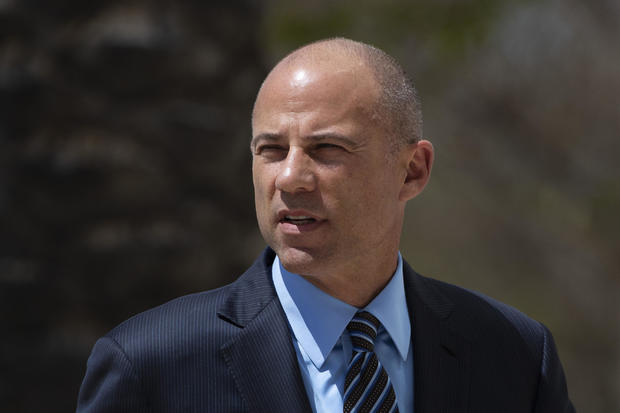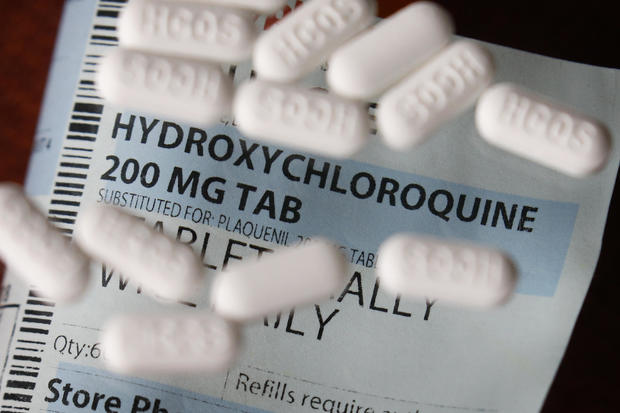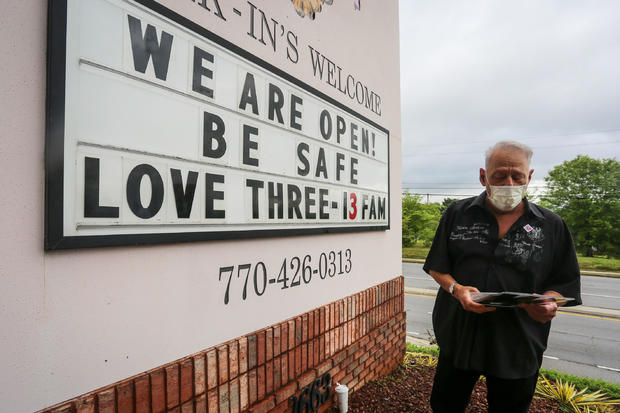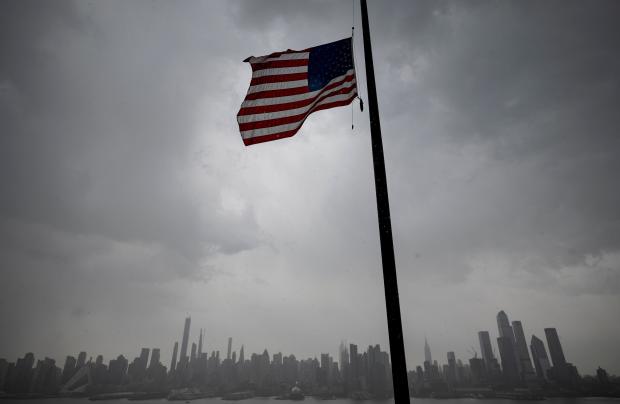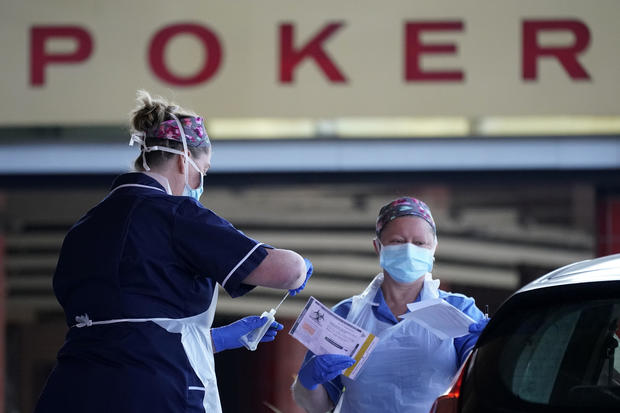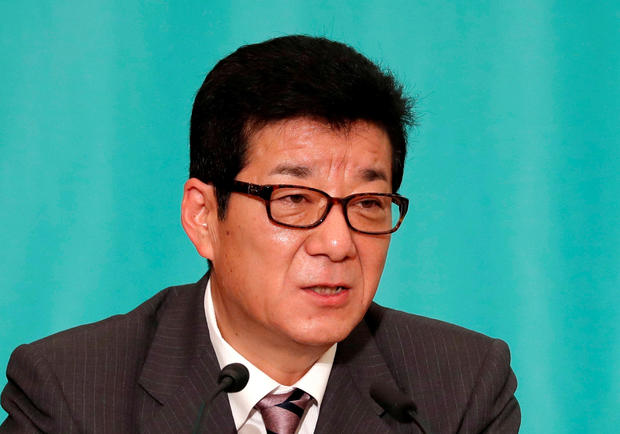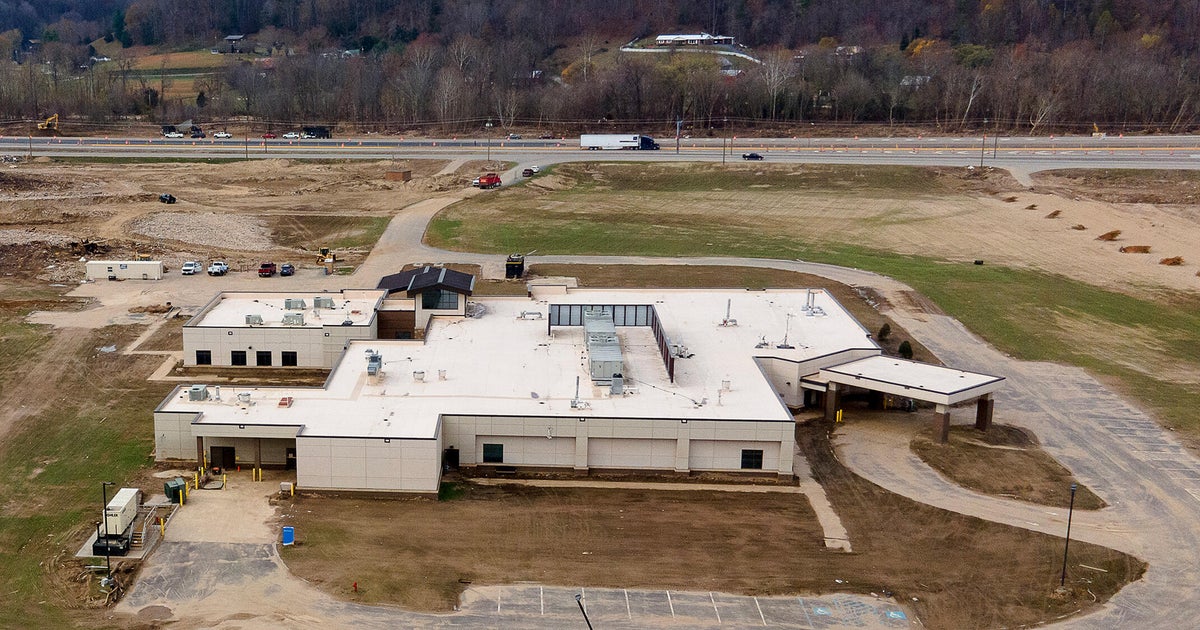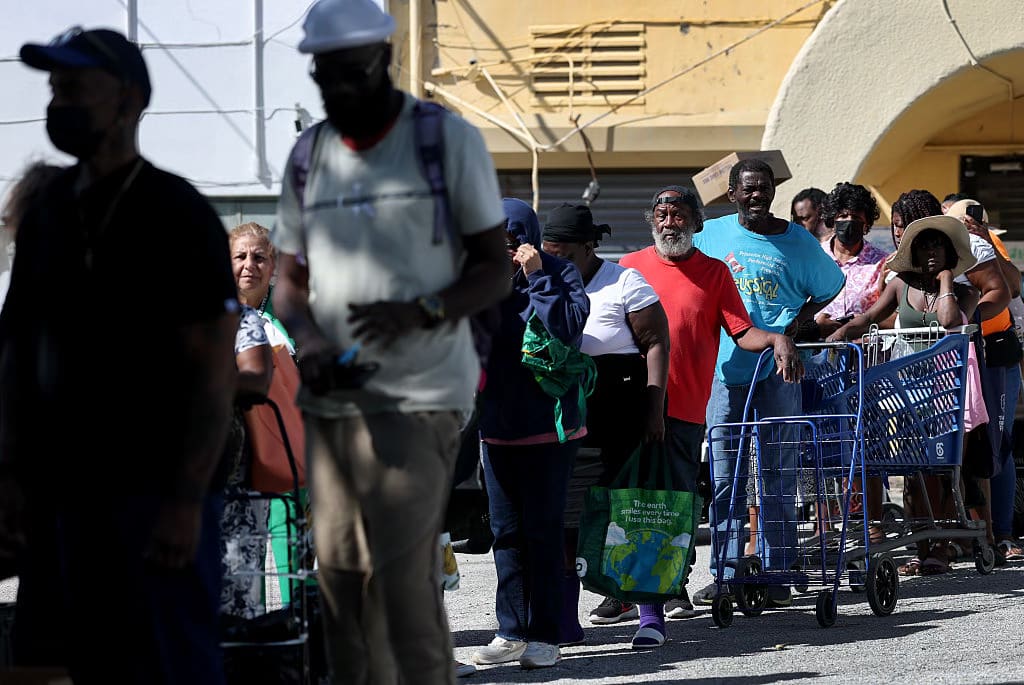Coronavirus updates from April 24, 2020
This live blog has finished. Click here for the latest coronavirus updates.
The death toll from the coronavirus in the United States passed 50,000 Friday morning, accounting for more than 25% of COVID-19 deaths globally, according to a tally from Johns Hopkins University. More than 2.7 million COVID-19 cases have been confirmed worldwide, with over 880,000 of them in the U.S.
Latest major developments:
- FDA warns about use of hydroxychloroquine, which Trump promoted as virus treatment.
- Despite hopeful signs in New York, Cuomo warns there's still a long road to recovery.
- Brazil becoming virus hotspot as hospitals buckle.
- Coronavirus is spreading fast in states that may reopen soon, study finds.
- Top Navy official recommends reinstatement of fired USS Roosevelt commander.
- Trump says he was being sarcastic when he floated disinfectant as virus treatment.
Detailed information from the CDC on coronavirus treatment and prevention.
Judge finds government is violating protections for migrant children during pandemic
The federal judge overseeing a 1997 court settlement that governs the care of migrant children in U.S. government custody ordered the Trump administration on Friday to promptly release minors from immigration detention, finding yet again that officials are violating the long-standing agreement.
Judge Dolly Gee of the U.S. District Court in Los Angeles found that U.S. Immigration and Customs Enforcement, which detains migrant families with children, and the Office of Refugee Resettlement, which has custody over unaccompanied minors, are both violating the Flores Settlement Agreement during the coronavirus pandemic, for distinct reasons.
Over the years and throughout different administrations, Gee has found that the government has violated elements of the settlement, primarily its requirement that migrant children be released from custody without "unnecessary delay." But Friday's order considered the risks faced by immigrants detained in close quarters during a deadly, global pandemic. In a different order last month, Gee called immigration detention centers "hotbeds of contagion."
The order applies to the approximately 2,100 unaccompanied minors in ORR custody, as well as the 342 children held with their families at the three ICE family detention centers.
Through Friday's order, Gee required both ICE and the U.S. refugee agency to "make every effort to promptly and safely" release the children in their custody who have sponsors, don't pose a danger to themselves or others and are not flight risks. She prohibited the agencies from using certain justifications to continue detaining minors.
Doctor details "torture" of watching her 4-year-old son struggling to breathe while battling coronavirus
As the coronavirus pandemic spreads throughout the world, countless gut-wrenching stories have emerged of families battling the virus. Some of the most difficult to hear are those which involve children. And Dr. Anna Zimmermann, a neonatologist in Denver, Colorado, just added her son's story to that list.
"Since March 12th, the kids have not left the house," she wrote in a blog post on her website, Mighty Littles. "My husband went to Costco once. I went to Target once. My kids never went on a playdate. I wouldn't let them go across the street to talk to their neighborhood friends. We adopted the stay-at-home recommendations early and stuck to them. We did everything right. But Lincoln got sick."
Zimmerman said her son, Lincoln, is four years old. He didn't know what coronavirus was when he was admitted to Rocky Mountain Hospital for Children, where his mother works in the NICU.
"At the time of admission, he needed 2 Liters (L) of oxygen. That same night, he progressed up to needing 4L. By the next day, he was on 6L and then 9L," Zimmermann wrote. "He was working so hard to breathe - using all of the muscles in his chest, abdomen, and neck to help him breathe. As a doctor, I knew he was working hard to breathe. The medical terms used to describe respiratory distress - seesaw breathing, nasal flaring, grunting, retracting, tachypneic - he had them all. As a mom, it was torture watching him struggle."
Small Business Administration disaster loan program is a disaster, business owners say
The federal government's disaster loan fund for small employers has drawn far less scrutiny than the infamously deficient Paycheck Protection Program, but it may be just as dysfunctional.
The Economic Injury Disaster Loan (EIDL) program, recently expanded to cover businesses affected by the coronavirus, offers qualified firms emergency cash advances of up to $10,000 on low-interest loans worth up to $2 million that are repayable over 30 years.
It sounds promising, but small business owners who have applied for the loans through the U.S. Small Business Administration describe the process as confusing and complain that the money is slow to materialize.
"We put in our EIDL application right away. First we were told it was for $10,000. About a month later, on April 23, we found money in our account, but it wasn't anything close to what we thought we were getting," said K.B. Brown, owner of Wolfpack Promotionals, a print shop in Minneapolis, Minnesota.
Weeks after he applied, Brown said he received a $3,000 advance on the loan, which isn't enough to cover even one month of business expenses. He doesn't know if he'll be approved for a larger disaster loan, noting that he hasn't received any follow-up information from the SBA.
"Right now, we need at least $25,000 on the low end to get caught up, make sure our vendors are paid, and bring people back," Brown said.
Brazil becoming virus hotspot as hospitals buckle
Cases of the new coronavirus are overwhelming hospitals, morgues and cemeteries across Brazil as Latin America's largest nation veers closer to becoming one of the world's pandemic hot spots.
Medical officials in Rio de Janeiro and at least four other major cities have warned that their hospital systems are on the verge of collapse, or already too overwhelmed to take any more patients.
Health experts expect the number of infections in the country of 211 million people will be much higher than what has been reported because of insufficient, delayed testing.
Meanwhile, President Jair Bolsonaro has shown no sign of wavering from his insistence that COVID-19 is a relatively minor disease and that broad social-distancing measures are not needed to stop it. He has said only Brazilians at high risk should be isolated.
In Manaus, the biggest city in the Amazon, officials said a cemetery has been forced to dig mass graves because there have been so many deaths. Workers have been burying 100 corpses a day - triple the previous average of burials.
Feds crack down on phony COVID-19 cures
Fears surrounding the spread of the novel coronavirus have spawned a rash of fraudulent cures involving dangerous behaviors like ingesting a powerful bleaching agent, or inhaling a toxic gas.
In Dallas on Friday, a federal judge granted a permanent injunction against Purity Health and Wellness Centers, a company that prosecutors allege solicited "ozone therapy," which involves inhaling ozone gas, as a cure or method of preventing COVID-19.
"This defendant preyed on public fear, peddling bogus treatments that had absolutely no effect against COVID-19," said U.S. Attorney for the Northern District of Texas Erin Nealy Cox in a statement. "As we've said in past COVID-19 civil cases: The Department of Justice will not permit anyone to exploit a pandemic for personal gain."
Despite hopeful signs in New York, Cuomo warns there's still a long road to recovery
In New York state, the epicenter of the U.S.' fight against the coronavirus, 422 new deaths were reported on Friday — the lowest daily number since April 1st. The total number of patients in hospitals has also dropped to nearly 25% less than the peak. But Governor Andrew Cuomo is warning that there's still a long road ahead.
"Number of new people coming into the hospital, number of new infections is slightly down, but that's basically a flat line," Cuomo said Friday. "And that is troubling."
Preliminary results from antibody tests in the state found that nearly 14%, or roughly 2.7 million people, showed evidence of past infection.
"If it turns out that it's higher than we even think, that's good and that's bad," said CBS News chief medical correspondent Dr. Jon LaPook. "On the one hand, it's bad because that means that a lot of people have been infected and probably spreading it asymptomatically. And that's hard to get your arms around. On the other hand, it's good because if it's asymptomatic and people recover without us knowing it, then no harm, no foul."
French hotel executive says rough year ahead
A French hotel executive predicts his business will remain "catastrophic" for the rest of this year and is counting on government help to survive the virus crisis.
Serge Cachan, president of the Astotel chain of Paris hotels, told The Associated Press: "Zero percent in April, probably in May and probably in June." He forecasts losses this year of 60-70%.
"Why should a hotel be open when you have no clients? When you have no restaurants. No museums. When you have no theaters, and when you have no planes, and when you close the borders. Why should the people come?" he asked.
Earlier Friday, French authorities said France won't reopen its restaurants, bars and cafes before June, as they announced reinforced financial support for the sector amid the virus crisis. Other tourist sites like museums will also remain closed.
Trump leaves press conference without taking any questions
After only short statements from President Trump, FDA Commissioner Dr. Stephen Hahn and Vice President Mike Pence, Friday's briefing ended without any questions from reporters. Other fixtures of the briefing, including Drs. Anthony Fauci and Deborah Birx, were not present.
CBS News' Weijia Jiang was the only reporter who was able to ask a question. Before the briefing ended, she asked FDA Commissioner Dr. Stephen Hahn about FDA approval for antibody testing.
After the short briefing, Axios reported that sources said Mr. Trump plans to "pare back" the daily briefings. Mr. Trump has been widely criticized after suggesting at Thursday's briefing that health experts look into the possibility of using disinfectant for coronavirus patients, perhaps by injection. On Friday, he claimed those remarks were "sarcastic."
2 turkey plants forced to shut down in Minnesota
A Hormel Foods subsidiary said Friday it's halting production at a pair of Minnesota turkey-processing facilities after some employees tested positive for the coronavirus.
Jennie-O Turkey Store Inc. said 14 employees had tested positive at two plants in Willmar, in western Minnesota, as of Thursday. The plants employ about 1,200 workers.
The plants are the latest to close nationally as meat processing plants wrestle with coronavirus infections among workers. The company didn't immediately respond to a question about how many turkeys the plants process daily.
Jennie-O President Steve Lykken said the facilities will be deep-cleaned while the company figures out a plan to reopen. He said the company has taken steps to protect workers, including physical distancing and personal protective equipment.
Oregon researchers produce ventilator with 3D-printing technology
A team from Oregon Health & Science University has come up with a low-cost ventilator produced with 3D-printing technology, the university announced.
"The goal is to provide it for free to whoever needs it," said Albert Chi, an OHSU trauma surgeon who previously pioneered 3D-printed prosthetics for children and is leading the effort.
Depending on the printer, a single ventilator can be manufactured in three to eight hours and made operational with the addition of low-cost springs available at any hardware store. The low-tech ventilators require no electricity, only a working oxygen tank, and can be replicated for less than $10 of material, the university said.
Hahn appears to acknowledge some antibody tests are not FDA-approved
CBS News' Weijia Jiang was the only reporter able to ask FDA Commissioner Dr. Stephen Hahn any questions on Friday. She asked if it was true that the FDA has no review of the antibody tests on the market, and there is no way to check their accuracy.
Hahn said under the policy, manufacturers have to validate their tests, tell the FDA the tests have been validated and let people know that those tests were not authorized by the FDA.
Additionally, Hahn said the FDA has authorized four tests and there are "more in the pipeline." Hahn said they are working to approve the tests that have been "self-validated."
Trump says "it's exciting to see" the country reopening
President Trump said Friday at the White House Coronavirus Task Force briefing that there is evidence the "aggressive strategy" the government took is working.
Mr. Trump said half of Americans live in states that are opening up their economy. "We're opening our country," Mr. Trump said. "It's very exciting to see. We have a lot of talent involved. From governors to people who just stand there and help you with the doors. Our country is in a great place and it's going to be greater than ever before."
Mr. Trump claimed 18 states have started to see decreases in the number of positive tests, and that New York has seen a 50% decrease in a week. On Friday, New York Governor Andrew Cuomo said the number of new infections in the state is "slightly down, but that's basically a flat line." Since April 18, the number of single-day deaths due to the coronavirus in New York have remained below 500. On Thursday, 422 died from the virus.
Who's ready to reopen? Only 4 states, Wall Street says
Which U.S. states are ready to reopen for business? Georgia on Friday let employers including hair salons and restaurants begin admitting customers, while Alaska, Oklahoma and Texas are discussing reopening strategies. Many other states' stay-at-home orders expire at the end of April.
Yet those states and the vast majority of others do not yet meet the criteria to start loosening coronavirus-related restrictions safely, according to research by health care analysts at investment banking company Raymond James.
Just four of 50 states meet all of the White House's criteria to begin a phased reopening, Raymond James wrote. Those are Kansas, Montana, Washington and Wyoming.
The findings are based on the guidance suggested in the White House's reopening plan, which are called "gating criteria." That plan recommends (but does not require) that states hold off on reopening non-essential businesses until they see a 14-day decline in flu-like illnesses and positive COVID-19 tests; hospitals can treat all patients; and there is a "robust testing program" that includes antibody testing that can confirm whether someone has been exposed to the coronavirus.
U.S. will send ventilators to several foreign countries
President Trump on Friday said the U.S. will be sending ventilators to several foreign countries, including Mexico, Honduras, Indonesia and Italy.
Michael Avenatti released from prison over coronavirus concerns
Attorney Michael Avenatti was released from a New York federal correctional facility on Friday after a judge ordered his release due to coronavirus fears, his attorney Dean Steward told CBS News.
Avenatti has been in quarantine for the past 14 days at the Metropolitan Correctional Center in New York, where he was awaiting sentencing after being convicted of trying to extort $25 million from Nike.
Steward said he is currently on a flight from New York to Los Angeles, where he will be on house arrest at a friend's house for the next 90 days. He is required to wear an ankle security bracelet, and is escorted on the flight, the lawyer added.
Avenatti's release came after his attorney argued in court papers that he was at risk of contracting COVID-19 in the facility because he had pneumonia six months ago. He is required to return to New York in 90 days.
Belgium taking steps to relax its virus lockdown
Belgium is taking its first serious steps to relax its coronavirus lockdown. After May 3, hospitals will progressively open to some non-essential tasks and textile shops also will be allowed to reopen. One week later, most shops will be given the green light to reopen at the same time, though close-contact professions like barbers will have to wait another week.
Also, as of May 18, the government will allow internal travel to the coast and the hilly, wooded Ardennes forests. Bar and restaurants will be allowed to start reopening as of June 8, as will be zoos. Travel authorizations will also be expanded.
Protective masks will be mandatory on public transportation.
Top Navy official recommends reinstatement of fired USS Roosevelt commander
The chief of naval operations has recommended that Captain Brett Crozier be reinstated as the commander of the USS Roosevelt, CBS News has confirmed.
Earlier this month, Defense Secretary Mark Esper had suggested it was possible Crozier's command of the carrier might be restored once an investigation into his firing was complete.
Crozier was removed from his command after a memo he circulated pleading for help from Washington became public. As of Friday, 856 members of the 4,000-person crew on the USS Roosevelt, a Navy aircraft carrier docked in Guam, have tested positive for the coronavirus. The Navy said 112 sailors have recovered and more than 4,200 have moved ashore.
Italy looking at new spending because of virus
The Italian government is asking Parliament to authorize staggering sums of new spending, drastically driving up the national public debt, after the COVID-19 outbreak made the country one of the most stricken by the pandemic.
Premier Giuseppe Conte's Cabinet has decided on a revised budget for this year, one that calls for $60 billion in debt, $27.5 billion next year, and similarly high debt for several more years. The budget must be approved by parliament.
The government says it must beef up the national health system, whose intensive care units were sorely tested by huge numbers of coronavirus patients, as well as provide additional funds for law enforcement and civil protection agencies to deal with the emergency. More funds will also be earmarked for private and public economic sectors and to provide safety measures for workers heading back to work after national lockdown, now in its seventh week.
Can bathing in bleach treat COVID-19 symptoms? Doctors say absolutely not.
CNN anchor Chris Cuomo's wife, Cristina Greeven Cuomo, announced on her blog that she bathed in a bleach solution while battling the coronavirus. Doctors say that's a very bad idea.
Cuomo said she decided to give the bath a try as a "more affordable" alternative to an IV vitamin drip to purportedly "neutralize heavy metals" in the body.
She added that Dr. Linda Lancaster suggested a bath with "a nominal amount of bleach," and explained that the idea is to "combat the radiation and metals in my system and oxygenate it."
Cuomo said since she had no sense of smell or open cuts, she decided to try it. "So, I add a small amount—1/4 to 1/2 cup ONLY—of Clorox to a full bath of warm water (80 gallons)," she wrote.
However, many doctors advise against trying this — and warn in stark terms that it could be dangerous. In an email to CBS News, microbiologist Dr. Dean Hart said bathing in bleach is a "bad idea."
"While us in science do not like to speak in absolutism, I have never heard, ever, of a bleach bath being recommended for the treatment of any disease," Hart said. "Don't do that. It is not a good idea, in fact, it's a bad idea. It could hurt you. The air becomes toxic around a bleach or chlorine bath. This has the potential to be very harmful, whether you are observing through your skin or breathing."
Puerto Rico to test nearly 9,000 inmates
Puerto Rico's Department of Corrections says it will test all the nearly 9,000 inmates being held across the U.S. territory to help prevent the spread of COVID-19.
Officials say 6,000 employees, including prison guards who work at the island's 32 correctional facilities, also will be tested.
Corrections Secretary Eduardo Rivera says officials have been testing new inmates since April 8. The announcement comes after a handful of inmates in recent days tested positive even though they were asymptomatic.
Puerto Rico has reported at least 77 deaths and more than 1,270 confirmed cases of COVID-19.
FDA warns about use of hydroxychloroquine, which Trump promoted as virus treatment
The FDA on Friday issued a warning against the widespread use of hydroxychloroquine, an antimalaria drug that President Trump repeatedly touted as a potential treatment for COVID-19. The warning comes just days after a study suggested the drug had no benefit for coronavirus patients and was even associated with more deaths.
The FDA said there were reports that some patients treated with hydroxychloroquine showed "serious heart rhythm problems." Patients with other health issues, such as heart or kidney disease, showed an increased risk of heart problems when they were treated with the drug.
"Therefore, we would like to remind health care professionals and patients of the known risks associated with both hydroxychloroquine and chloroquine," the agency wrote on its website, referring also to a similar drug.
"Hydroxychloroquine and chloroquine have not been shown to be safe and effective for treating or preventing COVID-19."
The agency said hydroxychloroquine should only be used in clinical trials or under careful medical supervision in hospital patients under an emergency use authorization. The FDA will continue to study the drug.
Accidental poisoning calls rising as Americans are told to disinfect more
A new report from the Centers for Disease Control and Prevention shows that emergency centers reported a 20% increase in accidental poisonings related to cleaners and disinfectants during the first three months of the year.
Data from the National Poison Data System has a breakdown of more than 28,000 calls related to cleaners and more than 17,000 reports linked to disinfectants.
The report said, "The timing of these reported exposures corresponded to increased media coverage of the COVID-19 pandemic, reports of consumer shortages of cleaning and disinfection products, and the beginning of some local and state stay-at-home order."
Inmates and families confused by federal guidance on home confinement release
Updated guidance from the Bureau of Prisons this week has left inmates and their families confused about the standards they must meet in order to qualify for release to home confinement, amid fears about the spread of COVID-19 among the prison population.
Leslie Lewis, sentenced to 24 months for a white-collar offense. is a first-time offender currently serving her time at Alderson FPC, a Women's Camp in West Virginia. She learned that she had been selected for release to home confinement and filled out her paperwork on April 15 and called her husband of 21 years, John, to share the good news. But by Monday their dream had been taken away from them.
"On Monday first thing in the morning, Leslie calls me, bawling. I know my wife enough to know she was shaking," John told CBS News in an interview. "She said they told her that she had been denied because of the 50% rule now, and they didn't give an explanation."
The original instruction came on March 26, when Attorney General William Barr directed the Bureau of Prisons to prioritize the use of home confinement for at-risk inmates as a means of curbing the spread of the COVID-19 pandemic.
Coronavirus is spreading fast in states that may reopen soon, study finds
The COVID-19 coronavirus has saturated the United States, and it appears to be spreading quickly in some places that are planning to ease social distancing restrictions soon, a new study shows.
County-level data shows COVID-19 cases in all 306 "hospital referral regions" in the United States, the areas where people go for hospital or specialist care, said study leader Dr. Elliott Fisher, a professor of health policy and medicine at The Dartmouth Institute in Lebanon, N.H.
"We need to be aware that this epidemic is far from over. The number of cases in every region today are higher than they were a week ago," said Fisher. "We have no place in the country where there are not cases being reported within a region."
The data also show that COVID-19 cases are growing more rapidly in places that have not been as heavily hit as New York City, Seattle, San Francisco and other early coronavirus hot spots. "The growth rates that are highest are now in the Midwest and in the South," Fisher said.
Colorado authorities close Walmart store after deaths
Health officials have ordered a Walmart to close after three people linked to the store died from coronavirus. Authorities said an employee, her husband and a security guard have died from coronavirus.
The Tri-County Health Department reports six confirmed cases of COVID-19 among employees, plus an additional three tests that are being processed.
"We are extremely saddened by this news and offer our deepest condolences to the family and loved ones of the three people we lost," said John Douglas, the department's executive director. "These deaths underscore the severity of the highly-contagious coronavirus, and the need for diligent safety precautions to prevent any further spread, including the wearing of masks.
A spokesperson for Walmart confirmed the store was closed for cleaning on Thursday. Health officials said the store will be able to reopen once the store demonstrates that all safety standards are met, including social distancing marks on the floor and masks for employees.
Correctional officer's death leads to calls to help prison staffers
Another New Jersey corrections officer has died from the coronavirus. Some prisons and jails around the nation have been a hotbed for the spread of the virus.
The New Jersey Department of Corrections continues to deal with more loss due to COVID-19. A correctional officer lost her life on Wednesday and its union says more needs to be done to keep the department safe.
"We just got to keep pushing for more PPE. We have asked for lesser movements with the inmates and they have listened to us," said Michael Tirado, with PBA Local 105, said.
Some changes have been made to New Jersey jails and prisons to lessen the risk of staff or inmates from contracting the coronavirus. But even with the changes, Tirado said the Department of Corrections lost at least two officers to the irus.
"Officer Nelson Perdomo from East Jersey State Prison and just recently yesterday, we lost Officer Maria Gibbs," Tirado said.
ESPN cancels summer X Games
ESPN on Friday canceled this summer's X Games, which were scheduled for July 17-19 in Minneapolis. "The safety of the athletes, staff and spectators is our top priority, and we will continue to closely monitor the situation for all X Games events," organizers said on Twitter.
France keeping new ICUs ready for second wave
France plans to keep thousands of newly built intensive care units ready for a second wave of virus cases, even though the first wave is now receding. Health authorities say France doubled its number of intensive care beds to more than 10,000 as the virus raced across the country.
"We need to keep the beds in case of a return of the epidemic," national health agency director Jerome Salomon says. "We need to maintain a vigilant posture."
Now fewer than 5,000 people are in intensive care with the virus, but people with other severe illnesses also need the beds.
France has reported more virus deaths than any country but the U.S., Italy and Spain. Salomon has announced more than 22,000 virus deaths so far in French hospitals and nursing homes.
California halts plastic bag ban and 10-cent charge
In an effort to stop customers from trying to bring their own reusable bags to grocery stores because of the risks they pose due to the coronavirus pandemic, California has temporarily halted the statewide ban on single-use plastic bags, along with the 10-cent charge for buying paper or plastic bags.
California Governor Gavin Newsom on Thursday signed an executive order suspending the ban for 60 days. Grocery stores are now able to give out single-use plastic or paper bags to customers for free. The order also allows stores to stop accepting recycled bottles and cans.
Miami goes seven weeks without a homicide for first time since 1957
Crime rates in cities nationwide have dropped as stay-at-home orders keep people indoors in an effort to fight the coronavirus pandemic. In Miami, Florida, there were no homicides for seven weeks for the first time since 1957, according to the Miami Police Department.
There were also no homicides during a six-week period for the first time since 1960. "We can say that it's due to our police high visibility, attributed with the pandemic and the Stay At Home order," a Miami Police Department spokesperson told CBS News.
Miami Mayor Francis Suarez declared a local state of emergency on March 12 to slow the spread of the coronavirus, and the order has since been extended six times in week-long increments.
Google, Apple adjust coronavirus tracking app to get ahead of privacy concerns
Apple and Google are making changes to the contact tracing program they've developed to help inform people when they may have been exposed to the coronavirus virus.
The contact tracing technology, which the two companies have been working on for a little over a month, was initially designed to help people alert one another if someone they were in contact with over a 14-day period was diagnosed with the virus. When the project was first announced, Apple CEO Tim Cook and Google head Sundar Pichai promised the technology would be built with privacy in mind.
Apple and Google said the technology will be opt-in, meaning it won't be turned on by default. The companies will offer programming tools to developers in mid-May, allowing health authorities to build apps with this new technology. Then Apple and Google plan to offer software updates to more than 2 billion active devices around the world using their software by the end of the year.
To ensure further security, Apple and Google said they'd change the contact tracing program to use better encryption, scrambling any identifying information to ensure people cannot be tracked. The companies are also protecting any potentially identifiable information about a person's phone, such as which model of phone they're using or the signal strength of their transmissions.
Doctor responds to Trump's comments on injecting disinfectant
President Trump alarmed health experts when he suggested injecting disinfectant and exposing the body to UV light rays might help fight the coronavirus at a Thursday task force briefing. (On Friday, Mr. Trump claimed he was being sarcastic). Dr. Bob Lahita, chairman of medicine at St. Joseph University Hospital, called the president's public suggestions a "mistake" in an interview on CBSN.
"There is no disinfectant-like treatment that is injected into the body. Categorically, absolutely, positively, no," he told CBSN anchors Vladimir Duthiers and Anne-Marie Green. "And as far as UV light goes, there are no treatments except perhaps for psoriasis, done under the guidance of a dermatologist."
Lahita denied that disinfectant was in any way OK for internal use, pointing out that "it's a very deadly thing" and said drinking bleach was something found in suicide attempts.
New York on "downside of the curve," but hospitalization rate remains high, Cuomo says
New York Governor Andrew Cuomo said Friday that "all the evidence suggests" the state is "on the downside of the curve." The governor, however, stressed that without maintaining precaution the virus could make a resurgence.
According to Cuomo, total hospitalizations are down in New York, but 14,200 people are still currently receiving treatment for the virus, and about 1,300 new infections are being reported daily.
"This is still not great news," he said. "Number of new people coming into the hospital, number of new infections is slightly down, but that's basically a flat line and that is troubling."
Since April 18, the number of single-day deaths due to the coronavirus in New York have remained below 500. On Thursday, 422 died from the virus.
"This is at an unimaginable level," Cuomo said of the lives lost. "It's dropping somewhat, but it's still devastating news."
Trump says he was being sarcastic when he floated disinfectant as virus treatment
President Trump claimed Friday that he was being sarcastic when he floated the possibility of injecting COVID-19 patients with disinfectant. Hours earlier, the White House press secretary had given a different explanation for the remarks, saying they were taken out of context.
"I was asking a question sarcastically to reporters like you just to see what would happen," the president told CBS News' Weijia Jiang in the Oval Office.
During Thursday night's coronavirus task force briefing, the president suggested that health experts look into the possibility of using disinfectant for coronavirus patients, perhaps by injection. Since then, the U.S. surgeon general and Lysol have come out strongly discouraging people from trying to ingest the product.
Some businesses in Georgia start reopening
Some businesses in Georgia reopened cautiously Friday as the Republican governor eased a monthlong shutdown amid experts' warnings of a potential new surge in coronavirus infections and a potent objection from President Trump. Georgia has ranked in the bottom per capita for testing and critics say Governor Brian Kemp's order was premature.
With deaths and infections still rising in the state, many business owners planned to remain closed in spite of Kemp's assurance that hospital visits and new cases have leveled off enough for barbers, tattoo artists, massage therapists and personal trainers to return to work with restrictions including screening of customers' for potential symptoms, protective gear and frequent cleaning.
David Huynh had 60 clients booked for appointments at his nail salon in Savannah, but a clothing store, jewelry shop and chocolatier that share a street corner with his downtown business, Envy Nail Bar, remained closed as he opened.
"The phone's been staying ringing off the hook," Huynh said. "We've probably gotten hundreds of calls in the last hour."
Baltimore crime drops during stay-at-home order
Overall crime is down in the city of Baltimore since the governor issued his "stay at home" order due to the coronavirus. When looking at crime statistics between March 13 and April 22 of this year compared to the same time span of 2019, crime is down across all segments, CBS Baltimore reports.
Here are numbers:
Aggravated assaults
2019: 437
2020: 362
Difference -17%
Common assault
2019: 916
2020: 603
Difference: -34%
Carjacking
2019: 38
2020: 32
Difference: -16%
Commercial robbery
2019: 77
2020: 46
Difference: -40%
Street robbery
2019: 278
2020: 196
Difference: -29%
Shootings
2019: 61
2020: 56
Difference: -8%
FDA warns of risks with Trump-promoted malaria drug
The U.S. Food and Drug Administration is warning doctors against prescribing a malaria drug widely touted by President Trump for treating the new coronavirus outside of hospitals or research settings. In an alert Friday, regulators flagged reports of serious side effects and death among patients taking hydroxychloroquine and the related drug chloroquine.
The drugs, also prescribed for lupus, can cause a number of side effects, including heart rhythm problems, severely low blood pressure and muscle or nerve damage.
Last month, the FDA authorized emergency use of the malaria drugs for hospitalized patients with COVID-19 who aren't enrolled in ongoing clinical trials. But regulators said they are investigating life-threatening side effects reported with the drugs to poison control centers and other health authorities.
Calls to U.S. poison control centers involving the malaria drugs have recently jumped 50%, from 52 calls in March 2019 to 79 last month, according to Dr. Christopher Hoyte of the Rocky Mountain Poison Center in Denver, Colorado. The problems reported include irregular heart rhythms, seizures, nausea and vomiting, Hoyte said.
13 U.S. meat industry workers have died of coronavirus, union says
Ten meatpacking workers and three food processing workers have died of COVID-19, according to the United Food and Commercial Workers (UFCW). In addition, at least 5,000 meatpacking workers and 1,500 food processing workers have been directly impacted by the virus, from testing positive for the disease it causes to missing work due to self-quarantine while they await test results, the labor group said.
The union, which represents 250,000 meatpacking and poultry plant workers, is calling for improved protections for those on the front lines of sustaining the nation's food supply.
The union's tally of fatalities is lower than one compiled by the Midwest Center for Investigative Reporting. The center found that as of Thursday there had been at least 3,400 reported positive cases tied to meatpacking facilities at 62 plants in 23 states and at least 17 reported worker deaths at eight plants in eight states.
Cuomo dares McConnell to pass law allowing states to declare bankruptcy
New York Governor Andrew Cuomo called Senator Mitch McConnell's suggestion that states could declare bankruptcy during the coronavirus pandemic "a really dumb idea."
The Senate Majority Leader said Wednesday he would rather let state governments declare bankruptcy than receive more federal funding. He also suggested Republicans should oppose additional aid for state and local governments in future coronavirus relief bills.
Unlike cities and local governments, state governments cannot declare bankruptcy. But McConnell told radio host Hugh Hewitt Wednesday that he "would certainly be in favor of allowing states to use the bankruptcy route."
"It saves some cities. And there's no good reason for it not to be available," he said. "My guess is their first choice would be for the federal government to borrow money from future generations to send it down to them now so they don't have to do that. That's not something I'm going to be in favor of."
Cuomo called the idea "the most un-American, un-charitable statement of all time." The governor said Friday at his daily briefing that New York gives the most money of any state to the "federal pot," while Kentucky takes the third most out of the pot. "Just give me my money back, senator," Cuomo said.
"I say pass a law allowing states to declare bankruptcy. I dare you," the governor said.
He warned that such a bill would signal "turmoil" to the markets, further jeopardizing the country's economy. "We'll see how many states take you up on it," he said.
At least 18 sailors assigned to Navy destroyer USS Kidd test positive
A U.S. Navy sailor assigned to the USS Kidd (DDG 100) was evacuated from operations at sea on Thursday and later tested positive for the coronavirus, the Navy said in a statement Friday. At least 17 sailors have since tested positive, and the Navy said it expects more cases.
The sailor who was evacuated is being treated in San Antonio, Texas. The Navy said the destroyer will be disinfected after returning to port.
The new cases follow a coronavirus outbreak among crewmembers of the USS Theodore Roosevelt. The Navy announced yesterday that all sailors assigned to the aircraft carrier have been tested for the coronavirus and that 840 of them tested positive.
There were 4,098 negative results, with a small number still pending. "Of the total cases, 88 Sailors have recovered, and 4,234 Sailors have moved ashore," the Navy said in a statement.
New York City mayor calls for rent freeze
New York City Mayor Bill de Blasio said Friday "it's abundantly clear we need a rent freeze."
"The facts couldn't be clearer - greatest economic crisis since the Great Depression," he said, CBS New York reported.
He called on Cuomo and New York City's Rent Guidelines Board to help tenants who can't pay rent at the start of May, and suggested that Cuomo let tenants use their security deposits to pay in May, or defer payment.
"Let renters use their security deposits to pay the rent now. This is something the state could do quickly and easily, and it makes so much sense. Those security deposits are stuck in escrow accounts. The tenant can't use them, the landlord can't use them until someone leaves their apartment for good," de Blasio said, reports CBS New York. "It makes no sense given that we're dealing with an absolutely unprecedented crisis."
"If people just run out of money, let them defer the rent. They can pay it back after a period of time. If people don't have any money, they don't have any money," he said.
Pandemic model estimates virus was spreading earlier than U.S. realized
New information suggests the coronavirus was spreading rapidly in the United States much earlier than first thought. Only 23 coronavirus cases in several major cities had been reported by March 1, but analysis from a Northeastern University pandemic model estimates there could have already been about 28,000 infections in those cities by that time.
Researchers say the first death caused by COVID-19 occurred in California at the beginning of February, three weeks earlier than the first confirmed death in Washington state.
"Those cases were not detected because if you don't test, you don't detect," Northeastern professor Dr. Alessandro Vespignani told CBS News' Dr. Jon LaPook.
Vespignani and his team modeling the virus' spread believe it likely began in the U.S. in January, and by mid-February, there were about 50 new infections per day.
Watch the full report:
U.S. death toll tops 50,000
The number of COVID-19 deaths in the United States has passed 50,000, according to a tally from Johns Hopkins University. Globally, over 192,000 people have died due to the virus.
There have been more than 2.7 million confirmed COVID-19 cases worldwide, including more than 870,000 in the United States.
Scientists lean on Ebola experience for new invention to protect doctors in COVID-19 fight
Eyes focused, hands steady, Dr. Jana Du Plessis quickly inserts a tube down the throat of a dummy behind a plexiglass box. It's called the Intubox, and it was designed to protect front-line health workers treating COVID-19 patients.
South African Emergency Medicine specialist Professor Feroza Motara heads up the team that developed the box for high risk procedures like intubation, which is required to put a patient on a mechanical ventilator.
"The risk is that when you are trying to do that intubation you are literally over the patient, so all that stuff, even with a mask and gown, all that aerosolized material is then hitting you, whereas now, it's in the box," Motara told CBS News.
Africa already had some success with a similar innovation treating Ebola patients — a large plastic cube that protects medical staff from that deadly virus. The Ebola CUBE was the inspiration for the South African design that was modified by aeronautical company Paramount to become the Intubox.
It took just two weeks from conception for the box to be rolled out to South African hospitals, and it's already been used successfully on several South African COVID-19 patients. Now there's interest from a few U.S. companies.
South Africa is bracing for an expected spike in COVID-19 patients, and while desperate times call for desperate measures, they also lead to great innovations.
Michigan governor Whitmer extends state's stay-at-home order
Michigan Governor Gretchen Whitmer extended her state's stay-at-home order through May 15 but is lifting restrictions so some businesses can reopen and the public can participate in outdoor activities like golf and motorized boating. The measure immediately replaces one that was scheduled to expire next week.
Michigan has nearly 3,000 deaths related to COVID-19, trailing only New York and New Jersey among U.S. states. Whitmer said in the new order the prior order had been "effective," and that "the strain on our health care system has begun to relent, even as our testing capacity has increased."
Social distancing measures will remain in place. People are now required to wear face coverings in enclosed public spaces such as grocery stores if they can medically tolerate it. Employers must provide non-medical grade masks to their in-person employees.
-CBS/AP
Italy timidly starts to reopen businesses after more than a month under lockdown
Businesses are starting to reopen all over Italy. The first country to issue nation-wide lockdown orders more than a month ago is now letting a limited number of shops get back to business. It has started with clothing stores for children and bookstores.
The International Monetary Fund expect's Italy's economy to contract by more than 9% by the end of the year — the worst projection in Europe.
The prime minister said this week that the country is on track to open even more businesses on May 4. The re-openings are thanks to the fact that, for the first time since this outbreak exploded, recoveries have started to outpace the number of new cases recorded daily.
But the timid loosening of the lockdown must be gradual and follow the science, the prime minister has said. Re-opening too soon could spark a second explosion of the virus in a country that has already suffered so much.
Large-scale human trial of potential COVID-19 vaccine kicks off at Oxford University
In the global scramble for a COVID-19 vaccine, a select number of human trials are now under way, but it's scientists from England's University of Oxford who appear most confident that they're onto a cure. Professor Sarah Gilbert heads the Oxford team behind the potential vaccine being developed in partnership with the Jenner Institute. She's said it has an "80% chance" of success, and it could be available for wide use by the public as soon as September.
Human trials of the vaccine began Thursday in Oxford. It will be administered to 510 healthy volunteers between the ages of 18 and 55.
U.K. Health Secretary Matt Hancock has said the government is "throwing everything" at efforts in the country to create a COVID-19 vaccine. He's pledged around $25 million in public funding for the Oxford project and an additional $27 million to research initiatives at Imperial College London. He says the U.K. is "at the front of the global effort" to find a vaccine. Click here to read more.
ExxonMobil modifies facilities to crank out 160,000 gallons of hand sanitizer for front-line workers
ExxonMobil announced Friday that it had reconfigured pants in Louisiana to produce hand sanitizer to donate "to COVID-19 response efforts in Louisiana, New Jersey, New Mexico, New York, Pennsylvania and Texas."
The petro-chemicals giant said it had modified equipment at facilities around Baton Rouge, Louisiana, increasing production of key hand sanitizer ingredient isopropyl alcohol, to "produce, blend, package and distribute" the vital supply to first-responders.
According to a statement, ExxonMobil hopes to ship 160,000 gallons of sanitizer, equivalent to almost 5 million of the typical 4-ounce bottles, with its initial wave of production.
Hand sanitizer, along with more vital personal protection equipment (PPE) supplies like face masks and medical gowns, have been in short supply in the U.S. for weeks amid the coronavirus crisis.
White House claims media taking Trump's "disinfectant" suggestion "out of context"
The White House attempted Friday morning to counter a wave of disbelief over President Trump's suggestion during the previous day's COVID-19 briefing that researchers look into the possibility of injecting COVID-19 patients with "disinfectant" as a treatment for the disease.
"President Trump has repeatedly said that Americans should consult with medical doctors regarding coronavirus treatment, a point that he emphasized again during yesterday's briefing," Press Secretary Kayleigh McEnany said Friday.
She accused media outlets of "irresponsibly" taking Mr. Trump's remarks "out of context" for the sake of "negative headlines."
Unemployed dad worries he'll have to choose between his insulin and feeding his kids
About one in six American workers — more than 26 million people — have filed for unemployment benefits in the past five weeks. Some Americans were already looking for jobs before the coronavirus shut down much of the economy.
Four Kansas aerospace workers who were laid off when Boeing suspended production of the 737 Max jet, weeks before the coronavirus crisis even hit, are still unemployed. Their severance has now run out and their health insurance will end next week.
"It's pretty bleak right now … It's a scary time to be without insurance," said Chris Jump, who was laid off as an aircraft mechanic. "If we hadn't got the stimulus check, I don't think we would have paid rent this month."
It's been a long frustrating search for Jump, who is a father of four. Click here to read more.
DraftKings to go public despite lack of live sports to bet on amid COVID-19 lockdowns
Sports daily fantasy and betting website DraftKings will debut as a publicly traded company Friday despite a near-complete shutdown of athletic competition across the globe due to the coronavirus pandemic.
DraftKings' move to Wall Street was sealed Thursday after shareholders of a blank-check company, Diamond Eagle Acquisition Corp., approved a merger. Blank check companies typically are publicly traded but have no operations of their own and aim to acquire or merge with others. Click here to read more.
U.K. submarine commander reportedly put on leave after crew held party during lockdown
A British Royal Navy submarine commander has been put on leave after ignoring social distancing rules and throwing a party for his crew on their arrival back home, BBC News reported Friday. Footage on social media showed two DJs playing dance music to the crew of the HMS Trenchant.
The crewmembers were sitting at tables eating a barbecue after the vessel docked for repairs at its base near Plymouth, southwest England, following three months at sea. The video shows sailors dancing and laughing, and a source told BBC News some were drinking alcohol.
The gathering went against government social distancing rules introduced to try to slow the spread of coronavirus, which has left more than 18,000 people dead in Britain alone.
-CBS/AP
Amid race to ramp-up COVID-19 testing, U.K. government's sign-up site crashes
Britain's government website for essential workers to schedule COVID-19 tests was closed to new applicants Friday just hours after it opened.
"There has been significant demand for booking tests today. We apologise for any inconvenience. We are continuing to rapidly increase availability," the Health Ministry said on Twitter, promising more tests would be available to book from Saturday.
Up to 10 million essential workers and members of their households are eligible for testing under the U.K. government's COVID-19 response policy, including health and social workers, police, food production workers, transport officers and journalists.
The aim is to allow any essential workers who show symptoms or have family members with symptoms to return to work as quickly as possible.
Increasing testing capacity has been central to the British government's strategy for tackling the coronavirus. Leaders have set the target of testing 100,000 people every day by the end of April.
Some experts have been skeptical of the government's capacity to deliver on its commitment. On April 22, the last day for which data is publicly available, only 23,560 COVID-19 tests were carried out.
Nebraska governor says he'll keep meatpacking plants open as shortages would bring "civil unrest"
Governor Pete Ricketts said Thursday that he doesn't plan to close any of Nebraska's meatpacking plants despite a surge in coronavirus cases in their surrounding communities that have turned them into the state's biggest COVID-19 hot spots.
Ricketts said he was concerned that shuttering the plants could hurt the state's food supply and lead to "civil unrest" if residents were to suddenly lose access to meat.
"You want to talk about some of these protests going on right now?" he said during a news conference. "Think about how mad people were when they couldn't get paper products. Think about if they couldn't get food. This is why it's vitally important that we keep our food processors open and do everything we can to ensure the supply chain, because we would have civil unrest if that was not the case."
WHO warns malaria deaths in sub-Saharan Africa could double this year as COVID-19 diverts focus
One of the hard lessons the World Health Organization learned during the Ebola outbreak in West Africa was this: Other diseases can be forgotten and take a deadlier toll.
The WHO is now warning that the battle against malaria in sub-Saharan Africa, where it already kills hundreds of thousands of people a year, could be set back by 20 years as countries focus energy and resources on containing the coronavirus.
The WHO said new projections indicate that in a worst-case scenario, 769,000 people could die of malaria in sub-Saharan Africa this year as campaigns to combat it are interrupted. That's more than double the deaths in the last detailed count two years ago, when more than 360,000 people died, and would be the worst figures for the region since 2000.
"We must not turn back the clock," Matshidiso Moeti, WHO regional director for Africa, said Thursday.
Joe Biden says he expects President Trump to try to postpone the election
Joe Biden predicted President Trump will try to push back November's general election in an effort to help him win.
"Mark my words, I think he is gonna try to kick back the election somehow, come up with some rationale why it can't be held," Biden said during a Thursday evening virtual fundraiser.
The presumptive Democratic nominee latched on to Mr. Trump's earlier resistance to grant COVID-19 federal relief money to the postal service, labeling the move "un-American." On April 10, the postmaster general requested help, saying the service was at a "critical juncture" and faced a net operating loss of more than $22 billion over the next 18 months.
Not financially assisting the postal service, Biden alleged, would be one way the Trump administration could impact proposed expansion of vote-by-mail efforts for the general election. Click here to read more.
Restaurant owner and Trump appointee says social distancing not practical for restaurants
Ray Washburne, a restaurant owner and member of President Trump's task force of business leaders working on how to reopen the economy, says social distancing isn't practical for restaurants.
"The people making policy on this obviously haven't been in the business," he told CBS News. Washburne, a Trump donor and member of the president's Intelligence Advisory Board, spoke to CBS News chief Washington correspondent Major Garrett for this week's episode of "The Takeout" podcast.
Washburne said opening up restaurants so they can serve customers at half-capacity wouldn't be feasible, and keeping restaurant workers and customers at a safe distance would be difficult to enforce.
"The economics just don't work. My belief is we're either all in or we're not, because half of one restaurant is just a money loser," Washburne said. "It just, practically, doesn't work." Click here to read more.
Japanese mayor draws fire for saying men should do shopping amid pandemic because they're "faster"
As Japan's leaders push residents to minimize the length and number of outings, an attempt this week by Osaka Mayor Ichiro Matsui to add the personal touch ended up touching off a firestorm. He suggested the best way to reduce shopping time was to delegate it to the man of the family.
"Men are faster. They just buy what they're told," he asserted. "Men go straight to where the product is shelved, put it in the basket. It saves time."
"I don't think this is an issue of gender," a male reporter gently pushed back. "It sounds odd when you say, 'women take more time to shop.'"
The 56-year-old conservative was unshakeable. "Well, in my house, my wife takes longer, and I'm faster."
The reaction was swift and generally unsympathetic. "People who have no clue what daily life is about, we don't need their advice," said one tweet.
"My husband ends up choosing the more expensive brand," said one woman. "Old dudes hanging around the store, don't they just get in the way? Better for them to stay home and watch the kids."
Recent government statistics show that while Japanese politics remains stuck in the Mad Men era, its society has drastically shifted. The most recent government white paper on gender equity found 11.88 million double-income households, and only 6.41 million families with a full-time housewife. Even so, a private survey last year by the Recruit company of over 1,000 full-time-employed couples found women still end up saddled with 70% of household and childcare chores.
Trump speculation draws prompt warning from Lysol maker not to ingest disinfectants
President Trump's suggestion that it might be possible to treat COVID-19 patients by the "injection" of disinfectants has drawn a warning from the company that makes Lysol.
"Due to recent speculation and social media activity, RB (the makers of Lysol and Dettol) has been asked whether internal administration of disinfectants may be appropriate for investigation or use as a treatment for coronavirus (SARS-CoV-2).
"As a global leader in health and hygiene products, we must be clear that under no circumstance should our disinfectant products be administered into the human body (through injection, ingestion or any other route)," RB said in a statement posted to its website.
Mr. Trump suggested the idea after a senior Department of Homeland Security official noted how effective common household disinfectants have proven to be at killing the new coronavirus on surfaces, as intended.
Trump suggests possibility of disinfectant "injection" as treatment for COVID-19 patients
During a briefing in which the White House pitched "emerging" research on the benefits of sunlight and humidity in diminishing the threat of the coronavirus, President Trump wondered aloud about the possibility of injecting disinfectants into patients.
Mr. Trump remarked at Thursday's White House briefing that he's seen that disinfectant "knocks it (COVID-19) out in a minute. And is there a way you can do something like that by injection inside or almost a cleaning? As you see, it gets in the lungs and it does a tremendous number on the lungs -- so it'll be interesting to check that. ... It sounds interesting to me."
But William Bryan, of the Department of Homeland Security, seemed to shoot the idea down as quickly as it was mentioned, saying it wasn't being considered. Click here to read more.
Trump says social distancing guidelines "may" be extended into summer or later
President Trump says the administration's social distancing guidelines "may" extend into summer, or perhaps beyond that, as states shift gears and plan the reopening of their economies. But there is potentially good news for summer — research shows the virus' lifespan is shortened by sunlight, heat and humidity, one administration expert said during Thursday's Coronavirus Task Force briefing.
The death toll from COVID-19 in the U.S. is likely to hit 50,000 in a couple of days, and there is no indication the pace of the nation's losses — in terms of both lives and the economy — is about to slow significantly.
"We're winning this and we're gonna win it," Mr. Trump said as he opened up the briefing. "And we're gonna keep watching and we're gonna watch very closely for the invisible enemy." Read more here.
Doctors find COVID-19 patients with unexpected blood clots
House approves $484 billion coronavirus relief package as unemployment soars
House lawmakers on Thursday voted to approve a $484 billion coronavirus relief package as new unemployment figures highlight the staggering toll the pandemic has taken on the U.S. job market. President Trump is now expected to sign the legislation, which lawmakers approved by a vote of 388-5.
The legislation, known as the Paycheck Protection Program and Health Care Enhancement Act, is the result of weeks of negotiations between congressional Democrats and the White House. The measure includes $75 billion for hospitals, $25 billion to establish a national testing regime, $60 billion in disaster aid and $310 billion for the Paycheck Protection Program (PPP), which provides loans to small businesses to help them retain workers and meet payroll. The PPP exhausted its initial $349 billion in funding last week.
The vote comes as new government data shows 4.4 million people filed initial unemployment claims last week, raising the total number of people who have lost their jobs during the pandemic to about 26 million.
Sunlight appears to have "powerful" effect on killing virus, DHS says
Acting Under Secretary of Science and Technology at DHS Bill Bryan said Thursday that emerging research has shown that solar light appears to have a "powerful" effect on killing the coronavirus.
The virus "dies the quickest in the presence of direct sunlight," Bryan told reporters at the Coronavirus Task Force briefing.
According to a slide shown at the daily White House Coronavirus Task Force briefing, the virus has a half life of 18 hours on a surface when it's 70-75 degrees, with 20% humidity and no sunlight. But when the humidity rises to 80% and sunlight increases, the virus' half life drops to two minutes.
Bryan talked about the existence on playground equipment as an example: In the sunlight, the virus would die very quickly, he said, although parts of the equipment in the shade would not be affected in the same way.
These studies may help guide governors in their decisions about what to open and when, Bryan added.
Bryan also said that bleach kills the virus in about five minutes, while isopropyl alcohol takes just 30 seconds.
